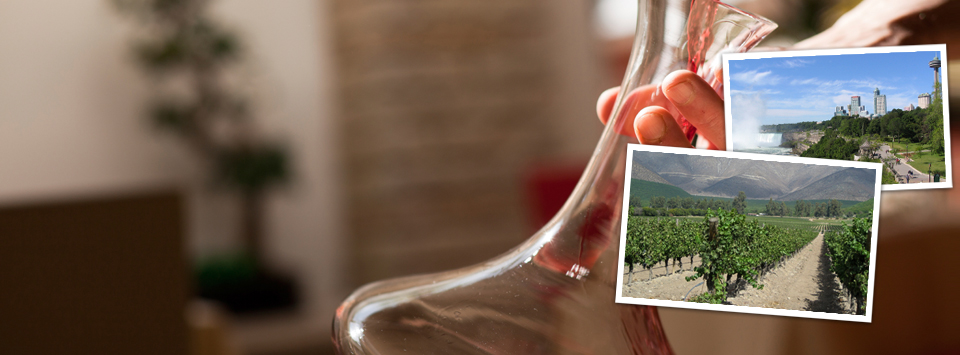
The Sommelier profession offers an exciting and rewarding career in the hospitality and tourism industries in the areas of wine and beverage management, wine sales, wine marketing, and all aspects of wine and beverage service. CAPS offers its Sommelier program at both George Brown College and Niagara College (Niagara-on-the-Lake). Upon successful completion students receive a joint certificate from CAPS and the college where the student is registered. The CAPS Sommelier certificate is recognized as a mark of professionalism in all 55 Association de la Sommellerie Internationale (ASI) countries.
CAPS Ontario continues to welcome all certified sommeliers as members of the association. Certification can come from many sources, including the Court of Master Sommeliers (CMS), the International Sommelier Guild (ISG), formerly known as the Canadian Sommelier Guild, and certification programs from other recognized programs within Canada and around the world.
Students are granted a complementary one-year membership to CAPS. This membership provides full membership privileges with the exception of voting rights.
Academic Year 2020 – 2021
Introduction
For those looking to be certified, CAPS Ontario, as part of its mandate, offers a one-year Sommelier Certification program. The program started in 2005.
How is the program structured?
The program is made up of three components:
A. the Academic Program,
B. the Stage, and
C. the Final Certification Exam.
Upon successful completion of all components, students will be granted their certification. In order to do this, students must attain a mark of 70% or higher in each module and 75% in each of the three major components of the Final Certification Exam, as well as a pass on the Stage.
What are the entrance requirements?
Pre-requisites* are required to enter the CAPS Certification Program. Courses such as WSET Advanced (Level 3) Certificate or ISG Wine Fundamentals Level 2 or successful completion of the CMS Certified level exams are considered as appropriate pre-requisites. Also accepted are Wines 1 and 2 from George Brown College and Sensory 1 and 2 from Niagara College. Other programs are accepted based on a review of the course description, content and evaluation criteria. For those who have not taken the formal prerequisites, the other option for entry is to sit a challenge exam; however, few opt for this.
*Prerequisite courses may be added.
A: How is the Academic Program portion structured?
The Academic portion is made up of seven (7)* in-class modules that vary in length.
Module I: Methods of Production (35 hours)
Module I’s focus is on viticulture and vinification theory and practices, including vineyard and winery tours.
Module II: Sensory and Wine Styles (63 hours)
This module and Module I – Methods of Production, form the base for the subsequent modules. Students are trained on the service skills and the structured tasting format they will use throughout the program, and in the Final Certification exam. Sensory and analytical skills are developed through an exploration of sensory and pairing approaches and practical exercises. Students explore the range of wine styles, and food and wine pairing, including culinary terms, cooking methods and other factors that impact the flavour profile of both wine and food.
Module III: Spirits and Other Beverages (35 hours):
This module includes study in spirits (white & brown), beer and sake. It builds on sensory skills and expands students’ knowledge of the range of beverages that can be paired with food and recommended to guests.
Module IV: Wines of the World – Old World (49.5 hours):
Regions are explored and key appellations are discussed in depth. Students continue to build their analytical and service knowledge and skills through tasting and wine pairing exercises. This module builds on Module II, and is focused assessing a wine’s character, quality and typicity through exploration of a wide variety of regions and appellations. History, laws, terroir, and other factors are discussed in detail.
Module V: Wines of the World – New World (36 hours):
This module covers the same areas of study as Old World (e.g. the impact of history, terroir, culture, laws, leading producers & trends), yet focused on the New World. Students analyze and identify wines by area of production and assess their quality and character. Honing of tasting, food pairing and service skills continues.
Module VI: Sommelier Management (35 hours):
The CAPS Final Certification Exam takes place after completion of all of the academic courses. The day has is made up of three main sections: sommelier management, final exam, and wine list correction; written blind tasting of six wines from around the world and a verbal blind tasting of three beverages; and, service. The final service exam is in a mock restaurant setting during which students must display competence in food and wine pairing, sparkling wine service, and decanting service.
Module VII: Certification Exam (8 hours):
The CAPS Final Certification Exam happens after completion of all of the academic courses. The students sit an exam that has 3 main sections: 1. Written theory and wine list correction; 2. Tasting, both written and verbal blind; and, 3. Service, in a mock restaurant setting, during which students must display competence in a) food and wine pairing, b) sparkling wine service, and c) decanting service. The exam takes one day to complete.
The first two modules are seen as the fundamental building blocks for the other five. Given that this Certification Program is an advanced level program, students are assumed to have the necessary pre-requisite knowledge.
* Please note that length and number of modules are subject to change. They may increase in length and number.
Further details of the current program:
B. The Stage: (minimum of 60 hours)
Students are expected to successfully complete the Stage component (a non-paid placement within the industry). This component is seen as key in providing students, regardless of their level of experience coming into the Program, with the opportunity to practice the skills they are learning in class and build both their skill and confidence in a real-time environment.
C. The Final Certification Exam - as detailed above.
While the curriculum is CAPS’s, the Program is currently delivered in conjunction with and under the supervision of CAPS with select academic institutions (e.g. Niagara College and George Brown College).
Delivery
§ Completion of the Program takes approximately one-year elapsed time, if the students work through all components based on the course schedule.
§ Modules are scheduled during the day. Currently, there is one weekday offering and one weekend (Sunday) offering. Classes are scheduled on Sunday (Niagara) Monday (George Brown).
§ Total cost of the Academic Program: Approximately $5,000. (includes wines, classroom handouts and the Final Exam but excludes books and other learning materials).
§ Instructors are selected from industry experts. Students benefit from a having a variety of instructors over the span of the Program. Instructors are professionals from the Canadian establishment and can include Masters of Wine, Master and Advanced level Sommeliers, wine educators and those with expertise in their specific content areas.
How much time will it take to complete the certification?
If students continue through the schedule of courses without a break, the estimated time of completion is approximately one-year elapsed time. Total in-course time is 253.5 hours and includes time allocated for the Final Certification Exam.
Concurrent with the course work, students must successfully complete a 60-hour Stage in industry, working with a Stage Mentor to hone their skills. Stages are unpaid placements.
Some students, due to unforeseen circumstances, find that they must withdraw from the program prior to completion. A student can re-join the program at a later date, with permission and provided the class is not fully subscribed. Students have three years to complete the program.
How much time do I need to set aside outside of class?
In addition to the time taken for the Stage, it is recommended that students set aside an additional 20 hours of time to study outside of class. We also recommend that they join and/or create a tasting group and meet at least twice a month.
Is there an opportunity to take the course on-line or distance learning?
Currently, the Program is only offered through in-class study. Work is in process for an online offering.
Where is the Program offered and how much does it cost?
Currently, the CAPS Certified Sommelier Program is delivered in conjunction with George Brown College and Niagara College. Due to administrative fees at the Colleges, costs vary slightly, however the total average cost for all six modules is approximately $5,000 and includes material fees (wines, etc). Textbooks and additional costs are not included. Tax receipts for appropriate tuition amounts are issued by the Colleges.
Do you have to be a CAPS Certified Sommelier Program graduate to be a member of CAPS?
No. CAPS as an Association is a not-for-profit organization that exists to promote and support the profession of Sommelier through the provision of networking, relationship building, and professional training and development opportunities (including tastings, seminars, etc). Voting membership is open to all certified sommeliers and indiviuals with approved qualifications. Members come from CAPS, ISG, CMS, etc. Corporate memberships are also available.
CAPS is a member of the Association de la Sommellerie Internationale/International Sommellerie Association (ASI) with 55 member countries and 4 observer countries (www.asi.info).
Disclaimer: The above information is intended as a guideline only and is subject to change. For specific details please contact Bruce Wallner, CAPS Director of Education, at education@on.sommelierscanada.ca
E&OE


